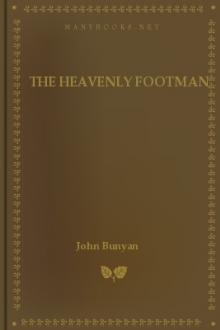The Children's Own Longfellow - Henry W. Longfellow (reading a book .TXT) 📗

- Author: Henry W. Longfellow
Book online «The Children's Own Longfellow - Henry W. Longfellow (reading a book .TXT) 📗». Author Henry W. Longfellow
Behold, at last, Each tall and tapering mast Is swung into its place; Shrouds and stays Holding it firm and fast!
Long ago, In the deer-haunted forests of Maine, When upon mountain and plain Lay the snow, They fell,--those lordly pines! Those grand, majestic pines! 'Mid shouts and cheers The jaded steers, Panting beneath the goad, Dragged down the weary, winding road Those captive kings so straight and tall, To be shorn of their streaming hair, And naked and bare, To feel the stress and the strain Of the wind and the reeling main, Whose roar Would remind them forevermore Of their native forests they should not see again.
And everywhere The slender, graceful spars Poise aloft in the air, And at the mast-head, White, blue, and red, A flag unrolls the stripes and stars. Ah! when the wanderer, lonely, friendless, In foreign harbors shall behold That flag unrolled, 'T will be as a friendly hand Stretched out from his native land, Filling his heart with memories sweet and endless!
All is finished! and at length Has come the bridal day Of beauty and of strength. To-day the vessel shall be launched! With fleecy clouds the sky is blanched, And o'er the bay, Slowly, in all its splendors dight, The great sun rises to behold the sight.
The ocean old, Centuries old, Strong as youth, and as uncontrolled, Paces restless to and fro, Up and down the sands of gold. His beating heart is not at rest; And far and wide, With ceaseless flow, His beard of snow Heaves with the heaving of his breast. He waits impatient for his bride. There she stands, With her foot upon the sands, Decked with flags and streamers gay, In honor of her marriage day, Her snow-white signals fluttering, blending, Round her like a veil descending, Ready to be The bride of the gray old sea.
On the deck another bride Is standing by her lover's side. Shadows from the flags and shrouds, Like the shadows cast by clouds, Broken by many a sudden fleck, Fall around them on the deck.
The prayer is said, The service read, The joyous bridegroom bows his head; And in tears the good old Master Shakes the brown hand of his son, Kisses his daughter's glowing cheek In silence, for he cannot speak, And ever faster Down his own the tears begin to run. The worthy pastor-- The shepherd of that wandering flock, That has the ocean for its wold, That has the vessel for its fold, Leaping ever from rock to rock Spake, with accents mild and clear, Words of warning, words of cheer, But tedious to the bridegroom's ear. He knew the chart Of the sailor's heart, All its pleasures and its griefs, All its shallows and rocky reefs, All those secret currents, that flow With such resistless undertow, And lift and drift, with terrible force, The will from its moorings and its course. Therefore he spake, and thus said he:-- "Like unto ships far off at sea, Outward or homeward bound, are we. Before, behind, and all around, Floats and swings the horizon's bound, Seems at its distant rim to rise And climb the crystal wall of the skies, And then again to turn and sink, As if we could slide from its outer brink. Ah! it is not the sea, It is not the sea that sinks and shelves, But ourselves That rock and rise With endless and uneasy motion, Now touching the very skies, Now sinking into the depths of ocean. Ah! if our souls but poise and swing Like the compass in its brazen ring, Ever level and ever true To the toil and the task we have to do, We shall sail securely, and safely reach The Fortunate Isles, on whose shining beach The sights we see, and the sounds we hear, Will be those of joy and not of fear!"
Then the Master, With a gesture of command, Waved his hand; And at the word, Loud and sudden there was heard, All around them and below, The sound of hammers, blow on blow, Knocking away the shores and spurs. And see! she stirs! She starts,--she moves,--she seems to feel The thrill of life along her keel, And, spurning with her foot the ground, With one exulting, joyous bound, She leaps into the ocean's arms!
And lo! from the assembled crowd There rose a shout, prolonged and loud, That to the ocean seemed to say, "Take her, O bridegroom, old and gray, Take her to thy protecting arms, With all her youth and all her charms!"
How beautiful she is! How fair She lies within those arms, that press Her form with many a soft caress Of tenderness and watchful care! Sail forth into the sea, O ship! Through wind and wave, right onward steer! The moistened eye, the trembling lip, Are not the signs of doubt or fear.
Sail forth into the sea of life, O gentle, loving, trusting wife, And safe from all adversity Upon the bosom of that sea Thy comings and thy goings be! For gentleness and love and trust Prevail o'er angry wave and gust; And in the wreck of noble lives Something immortal still survives!
Thou, too, sail on, O Ship of State! Sail on, O UNION, strong and great! Humanity with all its fears, With all the hopes of future years, Is hanging breathless on thy fate! We know what Master laid thy keel, What Workmen wrought thy ribs of steel, Who made each mast, and sail, and rope, What anvils rang, what hammers beat, In what a forge and what a heat Were shaped the anchors of thy hope! Fear not each sudden sound and shock, 'T is of the wave and not the rock; 'T is but the flapping of the sail, And not a rent made by the gale! In spite of rock and tempest's roar, In spite of false lights on the shore, Sail on, nor fear to breast the sea! Our hearts, our hopes, are all with thee, Our hearts, our hopes, our prayers, our tears, Our faith triumphant o'er our fears, Are all with thee,--are all with thee!
[Illustration: THE CASTLE-BUILDER Olive Rush
A castle-builder, with his wooden blocks, And towers that touch imaginary skies ]
THE CASTLE-BUILDER
A gentle boy, with soft and silken locks, A dreamy boy, with brown and tender eyes, A castle-builder, with his wooden blocks, And towers that touch imaginary skies.
A fearless rider on his father's knee, An eager listener unto stories told At the Round Table of the nursery, Of heroes and adventures manifold.
There will be other towers for thee to build; There will be other steeds for thee to ride; There will be other legends, and all filled With greater marvels and more glorified.
Build on, and make thy castles high and fair, Rising and reaching upward to the skies; Listening to voices in the upper air, Nor lose thy simple faith in mysteries.
[Illustration: PAUL REVERE'S RIDE Howard Smith
A voice in the darkness, a knock at the door ]
PAUL REVERE'S RIDE
Listen, my children, and you shall hear Of the midnight ride of Paul Revere, On the eighteenth of April, in Seventy-five; Hardly a man is now alive Who remembers that famous day and year.
He said to his friend, "If the British march By land or sea from the town to-night, Hang a lantern aloft in the belfry-arch Of the North Church tower as a signal light,-- One, if by land, and two, if by sea; And I on the opposite shore will be, Ready to ride and spread the alarm Through every Middlesex village and farm, For the country folk to be up and to arm."
Then he said, "Good night!" and with muffled oar Silently rowed to the Charlestown shore, Just as the moon rose over the bay, Where swinging wide at her moorings lay The Somerset, British man-of-war; A phantom ship, with each mast and spar Across the moon like a prison bar, And a huge black hulk, that was magnified By its own reflection in the tide.
Meanwhile, his friend, through alley and street, Wanders and watches with eager ears, Till in the silence around him he hears The muster of men at the barrack door, The sound of arms, and the tramp of feet, And the measured tread of the grenadiers, Marching down to their boats on the shore.
Then he climbed the tower of the Old North Church, By the wooden stairs, with stealthy tread, To the belfry-chamber overhead, And startled the pigeons from their perch On the sombre rafters, that round him made Masses and moving shapes of shade,-- By the trembling ladder, steep and tall, To the highest window in the wall, Where he paused to listen and look down A moment on the roofs of the town, And the moonlight flowing over all.
Beneath, in the churchyard, lay the dead, In their night-encampment on the hill, Wrapped in silence so deep and still That he could hear, like a sentinel's tread, The watchful night-wind, as it went Creeping along from tent to tent, And seeming to whisper, "All is well!" A moment only he feels the spell Of the place and the hour, and the secret dread Of the lonely belfry and the dead; For suddenly all his thoughts are bent On a shadowy something far away, Where the river widens to meet the bay,-- A line of black that bends and floats On the rising tide, like a bridge of boats.
Meanwhile, impatient to mount and ride, Booted and spurred, with a heavy stride On the opposite shore walked Paul Revere. Now he patted his horse's side, Now gazed at the landscape far and near, Then, impetuous, stamped the earth, And turned and tightened his saddle-girth; But mostly he watched with eager search The belfry-tower of the Old North Church, As it rose above the graves on the hill, Lonely and spectral and sombre and still. And lo! as he looks, on the belfry's height A glimmer, and then a gleam of light! He springs to the saddle, the bridle he turns, But lingers and gazes, till full on his sight, A second lamp in the belfry burns! A hurry of hoofs in a village street, A shape in the moonlight, a bulk in the dark, And beneath, from the pebbles, in passing, a spark Struck out by a steed flying fearless and fleet: That was all! And yet, through the gloom and the light, The fate of a nation was riding that night; And the spark struck out by that steed, in his flight, Kindled the land into flame with its heat.
He has left the village and mounted the steep, And beneath him, tranquil and broad and deep, Is the Mystic, meeting the ocean tides; And under the alders that skirt its edge, Now soft on the sand, now loud on the ledge, Is heard the tramp of his steed as he rides.
It was twelve by the village clock, When he crossed the bridge into Medford town. He heard the crowing of the cock, And the barking of the farmer's dog, And felt the damp of the river fog, That rises after the sun goes down.
It was one by the village clock, When he galloped into Lexington. He saw the gilded weathercock Swim in the moonlight as he passed, And the meeting-house windows, blank and bare, Gaze at him with a spectral glare, As if they already stood aghast At the bloody work they would look upon.
It was two by the village clock, When he came to the bridge in





Comments (0)